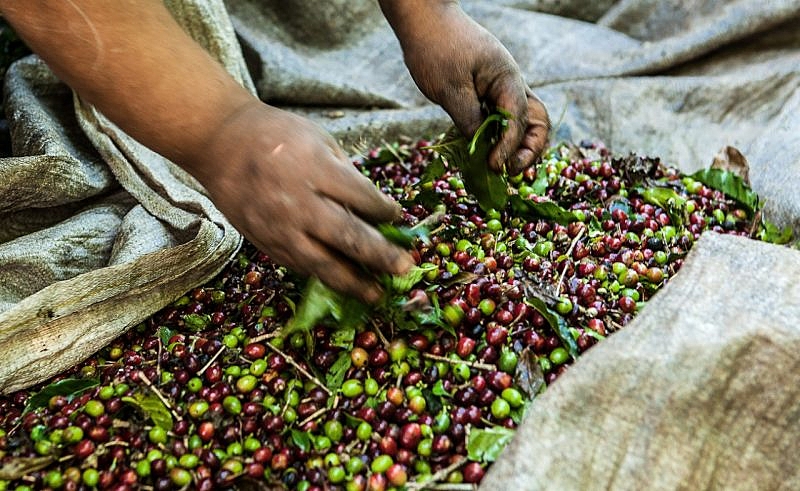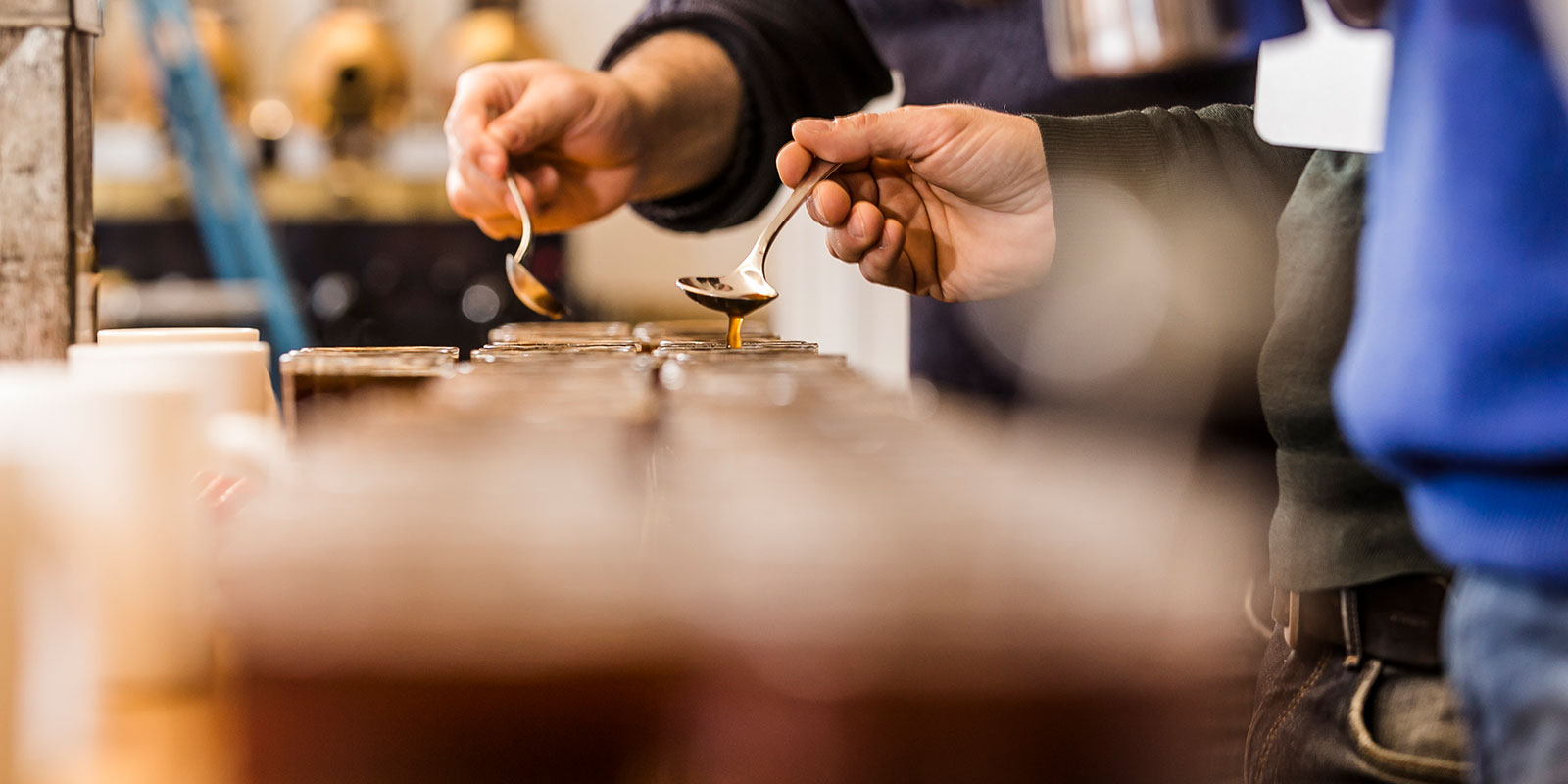Incidents of labour under conditions analogous to slavery on Brazilian coffee farms during the 2021 harvest were not enough to provoke a reaction from major importers of the bean in the United States and Europe.
In October, Repórter Brasil told the story of workers who lived in precarious housing and were forced to pay their employer for food, gas and rent. The seasonal workers, who received less than half of a minimum wage at the end of the month, could not even buy a ticket back home in the municipalities of Minas Gerais and Bahia.
On Laranjeiras Farm, owned by Job Carvalho de Brito Filho in Ilicínea (MG), 24 workers were identified in conditions analogous to slavery in July 2021. In the Floresta Farm, owned by Guilherme Sodré Alckmin Júnior, in Heliodora (MG), labour inspectors rescued another 20 workers in a similar situation. In the following month, seven more workers were freed at Haras July Farm, of producer Luiz Sérgio Marques, in São Sebastião do Paraíso (MG).
Customs records accessed by Repórter Brasil show that regional trading companies and cooperatives supplied by the three coffee growers continue doing business with at least five multinational companies in the Northern Hemisphere. Through these importers, coffee “contaminated” by human rights violations can reach hundreds of countries. The Italian multinational Lavazza alone, one of those cited in this report, is present in over 140 countries.
In the latest edition of the register of employers held responsible for slave labour, known as the “dirty list”, published by the Ministry of Labour in April this year, coffee is the economic sector with the most records of workers in situations analogous to slavery, with 122 rescued.

In 2021 alone, labour inspectors rescued 310 victims of slave labour on 20 coffee farms. This was the highest number since 2003. The employers are still not on the “dirty list” because they have the right to defence in two administrative instances.
Indirect suppliers
Producers Marques and Brito Filho have a history of business relationships with the São Paulo cooperative Coopercitrus, a supplier to the List + Beisler company, specialising in premium coffees, based in Hamburg, Germany, with operations in the US since 2018.
Customs data show that List + Beisler imported two batches of coffee from Coopercitrus between December 2021 and January 2022 — after the workers’ rescues and the publication of the story detailing the cases.
Questioned by Repórter Brasil at the beginning of the month, Philip von der Goltz, managing partner of the company, emphasized the company’s commitment to sustainability and said he was unaware, until then, of the content of the allegations. He argued that a great deal of information about the coffee chain is published daily, making it difficult to follow up on cases.
“With all respect, there are endless articles – true or false, well or badly written, correctly or poorly researched – published almost every second. Are you seriously wondering why we did not read your report when it was published? Why would anybody in another part of the world read exactly yours when it was written in a foreign language (Brazilian) and also published in a different country (Brazil)”, he questions.
The responses sent by the representative of List + Beisler, as well as by the other companies mentioned in this report, can be read in full here.
“An international buyer claiming that they didn’t know that a certain human rights violation was occurring in their supply chain, nowadays, is completely unacceptable”, says Gustavo Ferroni, coordinator of Rural Justice and Development at Oxfam Brazil.
“The UN Guiding Principles on Business and Human Rights clearly state that businesses have an obligation to know and demonstrate how their direct and indirect operations, through their supply chains, impact on human rights, and place an obligation on businesses to carry out ‘due diligence’: to investigate, monitor, prevent and mitigate risks”, he adds.
The manager of List + Beisler says that the company has never bought coffee from the farms mentioned. Repórter Brasil again sought Coopercitrus to verify whether the company would like to update the statement sent in October, but did not receive a reply by the time this report was closed.
Lack of transparency
“The buyers usually claim that the coffee they buy does not come from the farm that was caught. But you can’t find anywhere the exact information about which farm each bag of coffee comes from, as already occurs in other supply chains”, explains the Oxfam Brazil member, citing as an example the case of palm oil, whose origin can be verified. “The coffee chain is not reliable, is not transparent, does not allow traceability and presents a lack of control between the coffee produced with and without irregularities.”
Brazil, the world’s largest coffee exporter, produced 47.7 million bags last year. Around 46% of production was harvested in Minas Gerais, which leads the ranking of producing States. The cases cited in the report refer to green coffee exported in beans by small, medium and large coffee growers through trading companies or cooperatives.
“In general, coffee cooperatives are gigantic organisations, some with up to 100 technicians to advise members”, notes Ferroni. “We would need these technicians to circulate during the harvest, visiting the farms, with surprise audits, to prevent irregularities, and not depend only on government inspection.”
Complicity
Besides his relationship with Coopercitrus, Job Carvalho de Brito Filho was also a member of Cocatrel Direct Trade (CDT), the specialty coffee export department of the Cooperative of Coffee Growers of the Três Pontas Zone (Cocatrel) in southern Minas Gerais.
Cocatrel did not respond to Repórter Brasil’s questions when the report with the allegations was published in October last year, and only issued an official statement on the case in April 2022, after being confronted by an international buyer contacted during the investigation of this report. In the statement, Cocatrel admits that the supplier fined for slave labour remains among the members of the cooperative. Read the full statement.

“Cocatrel informs all its business partners that Mr Job Carvalho de Brito Filho (…) is part of its membership and that he is temporarily suspended from the Cocatrel/CDT Partners Map and its Certifications, in view of his involvement in a labour inspection that occurred between July 23 and 30, 2021”, the statement said.
Brito Filho’s temporary suspension from the list of suppliers was personally informed to the producer on 14 December 2021, almost five months after the rescue of the workers.
On the same day, Cocatrel visited Laranjeiras Farm for a “social risk analysis” — according to a document sent to the reporters by a representative of the cooperative’s export sector. On that occasion, a “high risk” was found in relation to slave labour, housing conditions, sanitation and access to drinking water, and a “medium risk” of occurrence of child labour and sexual, physical or psychological harassment or abuse on the property.
After this analysis, Cocatrel listed a series of measures to be adopted by the producer to mitigate the risks identified. Temporarily excluded from the supplier list, Brito Filho is still authorised to use the cooperative’s structure to store coffee.
“Stopping purchases only after government inspections is already a problem, because rights were violated due to the lack of preventive action. Afterwards, keeping the producer as a member of the cooperative and still stocking his production seems to me to be complicity”, analyses Gustavo Ferroni, from Oxfam Brazil.
Zero tolerance?
Four international buyers maintained business with Cocatrel even after the case was publicised.
Falcon Coffees, with speciality coffee trading offices in the UK, Germany, USA and Malaysia, imports monthly from the Minas Gerais cooperative and received “in shock” the information about Brito Filho’s case, described by email by Repórter Brasil.
After the reporter’s contact, the company consulted its own database for chain tracking, contacted the supplying cooperative and said it confirmed that it did not purchase grains produced on the farm where the violations occurred.
“Whether Falcon will continue to purchase coffee from a cooperative in an instance such as this will depend on the circumstances, the cooperatives policies and crucially, their response to such findings (or even allegations)”, informs Konrad Brits, CEO of Falcon Coffees.
The company requires its suppliers to sign a document attesting to compliance with sustainability and protection of the environment and human rights guidelines. According to the CEO, the importer proposes to visit all suppliers every two years, but the trips have been made impossible by the Covid-19 pandemic.
One of the largest coffee distributors on the planet, Italy’s Lavazza claims that the last batch acquired from Cocatrel was shipped in October 2021. Customs records accessed by the reporters, however, show a more recent shipment, in December. “The Group is doing all the appropriate investigations and evaluations on Cocatrel, that is a very marginal supplier for the Lavazza Group, representing the 1% of the total amount of coffee purchased in Brasil”, the multinational said.
“Should one of our suppliers become involved in conduct contrary to our policies and codes of conduct, following timely and appropriate checks, we will implement support and corrective activities and, in case of negative feedback, we will immediately exclude this supplier from our supply chain”, the company added.
The limits of the “dirty list”
Two other international clients of Cocatrel also buy coffee from Nutrade Comercial Exportadora, a trading company of the Swiss multinational Syngenta. Nutrade was supplied by Floresta Farm in 2021, when 20 workers were rescued on the property.
The American company Rothfos Corporation, linked to the Neumann Kaffee Group (NKG), acquires Nutrade’s batches every month and says it uses the “dirty list” as a parameter for supplier assessment. The owner of Floresta Farm, Guilherme Sodré Alckmin Júnior, is not included in the most recent register because he can still appeal in two administrative instances.
“NKG is committed to eliminating forced labor and any other form of labor rights violations within our sphere of influence. No company of NKG, including Rothfos Corporation, would knowingly purchase coffee produced by farms that violate human rights or local law”.
“Our local trading partners Nutrade and Cocatrel have assured that they do not trade coffee from producers who are on the ‘Lista Suja’”, adds the multinational, one of the global market leaders in green coffee beans.
Swiss multinational Sucafina, like Rothfos, has maintained business with Nutrade and Cocatrel after its suppliers were fined. Present in 29 countries, the company also says it has zero tolerance for child labour and all forms of forced labour. In addition to consulting the “dirty list”, Sucafina claims to have a code of conduct for suppliers based on the UN Principles.
“We regularly visit our suppliers in the field to assure ourselves of their ethical operating conditions. All our contracts contain a specific clause (among others) concerning forced labor that all suppliers must agree to abide by if they want to work with us”, the company stresses in a statement.
Over the past year, Sucafina has commissioned an external review of its supply chain monitoring policies and held online training sessions to raise staff awareness of the challenge of protecting human rights. “We are conscious that we must collectively do more to address this systemic issue, and we can’t do it alone. The coffee industry, governments, NGOs, and civil society must work together to tackle the issues”, the multinational added.
When contacted again by Repórter Brasil, Nutrade preferred to maintain the statement sent in October, in which it said it was monitoring the unfolding of the slave labour cases among its coffee suppliers. The company reinforced that the three coffee growers have not yet been included in the “dirty list”.
According to Gustavo Ferroni, the importers should take immediate action in case of slave labour incidents, and not wait for the publication of the name of the suppliers in the “dirty list”. “The UN Principles are very clear in this sense. Companies have an obligation not only to know, but to demonstrate that they do not violate human rights.”

